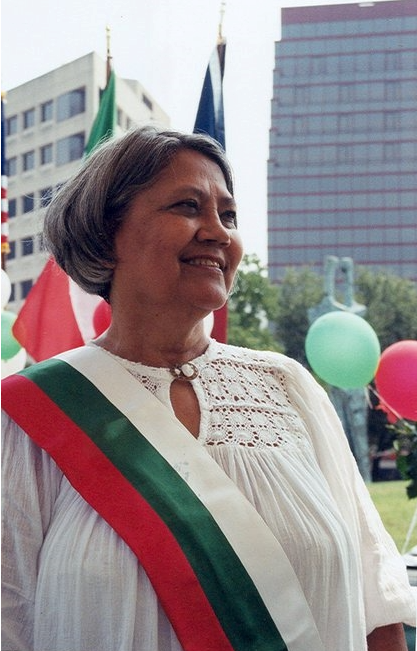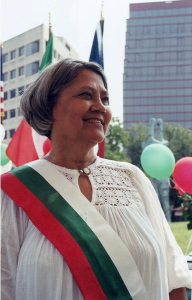Martha Cotera: A Revolutionary Woman
Martha Cotera is one of three women of color telling their stories of activism at a historic event titled “The Second Wave: Revolutionary Women of Color.”

By Kira Schwarz ‘22

Martha Cotera wears her Mexican heritage with pride.
Before she was archiving priceless political documents for the University of Texas Benson Latin American Collection, Martha Cotera was born in Casas Grandes, Chihuahua, Mexico. She grew up playing by the indigenous settlement site of the Mogollon culture, which would later be “discovered” by the University of Texas and the Mexican government.
“The communities around them knew that they were there. When it rained, things would come out, like little necklaces and tokens,” Cotera shared. “My grandmother always made us put them back.”
Later on, Cotera moved to El Paso after her mother remarried, where she attended elementary and high school. She loved learning and was active in her newspaper and English club. Despite her deep affinity for education, she was faced with discrimination when her teachers graded her and other Latinos lower than their white peers.
“You had to fight for your grades, otherwise, you’d get all Cs,” Cotera recalled. “Consequently, a lot of the Mexicanos who went on to college were very successful and the Anglos that had grade inflation? They didn’t do so well.”
Cotera went on to attend college at University of Texas at El Paso, which was called Texas Western College at the time. During her time there, she worked as a librarian and found the significance of archiving important literature. In 1963, she graduated and married her college sweetheart. The two of them moved to Austin where they faced a city much different from today.
“Before, I had been a middle-of-the-road civil-rights worker; a political worker here and there. But coming to Austin, I was totally radicalized and I’ve never gone back,” said Cotera. “Austin was very progressive for white people, and very southern Democrat for others.”
In 1971, Cotera and her husband founded La Raza Unida Party, a Texas political party that promoted the election of Mexican-American officials at the height of the Chicano civil rights movement. Although the party’s aim was to fight the oppression of all Mexican-Americans, Cotera sought to mobilize Chicanas within the party in pursuit of another movement.
“Before Raza Unida, I was very involved in promoting the Equal Rights Amendment. When my husband and I became founders of La Raza Unida, I started working on a women’s caucus within the party,” Cotera explained. “It just makes sense to me because if you’re working for liberation, you can’t do it by gender. It’s a liberation for all.”
At first, La Raza Unida Party discouraged its women’s caucus from entering the women’s movement. They felt that if Chicanas joined mainstream feminism, the strength of their main party would be diluted. Cotera and her female colleagues thought the opposite.
“We had feminists working within the Chicano movement, and within Raza Unida, and then we had some of us working within the mainstream feminist movement with people like Ann Richards and Hillary Clinton,” said Cotera. “People would ask our movement in particular, why would you want to do that? We wanted to peel off women and others. Anyone was welcome to come into La Raza Unida Party and to come into our movement. We didn’t care what color they were. We wanted them as our colleagues.”

The Second Wave: Revolutionary Women of Color gives three second wave feminist leaders the opportunity to speak about their experiences on March 24 at 5pm at the Annenberg Presidential Conference Center.
Despite the strength and size of Las Mujeres de La Raza Unida, Cotera felt that the mainstream feminist movement didn’t utilize their power.
“Working with the feminist movement was very difficult,” Cotera said. “A lot of the feminist movement had a blind eye when it came to women of color. They treated Native American women, Asian women, and African American women the same way, but particularly Chicanas because they thought we were passive.”
According to Cotera, the exclusion was frustrating because it was widely felt that most of the feminist movement consisted of women with little activist experience. Many Chicanas had long been involved in grassroots activism, notably protesting the harsh conditions of migrant camps in agricultural fields. Latinas also had higher percentages of labor participation than their white counterparts, and more experience with community involvement.
“When the women dropped the ball in 1980 when the administration changed to Republican, and all the things we had worked for on behalf of women went away, it was a real tragedy,” Cotera said. “They could not understand what we brought to the table. They couldn’t understand why we were valuable. They couldn’t see past their own upbringing and lens of what we could bring.”
Cotera continues to support women from the grassroots and state levels and feels that today, the real action lies in grassroots activism. The way she sees it, Latinas have continued to be effective in grassroots communities. The loss they faced has become a legacy of strength, perseverance, and winning battles, and the results are evident in the number of Latinas running for office.
“You know, everytime I lecture at a university class, the first thing I ask is, ‘How many of you think that Latina women are passive?’ There’s not a single hand that goes up,” Cotera laughed. “I have yet to see a Latino hand go up who thinks our women are passive because they know otherwise.”
Cotera is one of three revolutionary women of color providing a window into the historical fight for women’s rights during “The Second Wave: Revolutionary Women of Color” on March 24 and 25.
